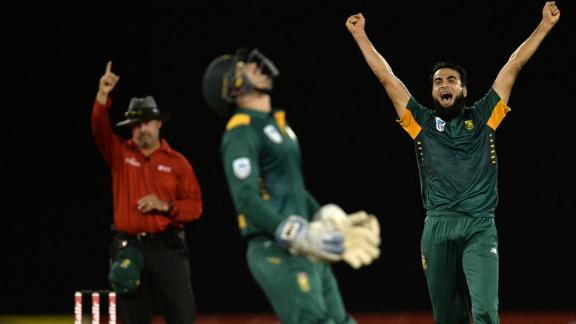South Africa 189 for 9 (Behardien 62, Maxwell 2-15, Hazlewood 2-20) beat Australia 142 (Finch 72, Rabada 3-13) by 47 runs
Scorecard and ball-by-ball details
South Africa posted only one run more than the 188 they had managed in their triangular series opener against hosts West Indies but it was enough to give them a first win in three meetings against Australia in the Caribbean
South Africa posted only one run more than the 188 they had managed in their triangular series opener against hosts West Indies but it was enough to give them a first win in three meetings against Australia in the Caribbean. The 47-run victory meant that the Guyana leg of the tournament ended with all three teams securing points.
Farhaan Behardien's fifth ODI half-century helped South Africa recover from 112 for 6 but it was the bowlers who took them to the win. Fielding an attack that included three specialist spinners for the first time in five years - since their World Cup clash against Bangladesh in 2011 - South Africa allowed only Aaron Finch to score more than 30.
Particularly impressive was chinaman bowler Tabraiz Shamsi, who made his debut and threatened a wicket with every ball. He finished with only one scalp but could have had at least two more. He had lbw appeals against Finch and Matthew Wade turned down even as replays showed both would have gone on to hit the stumps.
By the time Shamsi was brought on in the 12th over, South Africa's seam attack, which had none of Morne Morkel, Kyle Abbott or Chris Morris, had already removed three of Australia's top four. Wayne Parnell, having last played international cricket in July 2015, celebrated his return by trapping David Warner lbw in his first over. He then trapped Steven Smith lbw in the eighth over. In between, Kagiso Rabada had beaten Usman Khawaja for pace to rattle the stumps.
Finch did not find substantial support. Glenn Maxwell became Shamsi's first international victim when he was given lbw before Mitchell Marsh tried to cut Imran Tahir and edged behind. Australia were reduced to 72 for 5 by the 17th over. Two balls later, Finch swept his way to a half-century off 58 balls.
AB de Villiers brought Rabada back for a second spell in the 20th over and it reaped reward. Rabada had Wade caught behind and then bowled Nathan Coulter-Nile with an inswinging yorker to leave Australia at 85 for 7.
Everything seemed to be going South Africa's way until Rilee Rossouw, chasing the ball from backward point, crashed shoulder-first into the ground as he hauled it in. He was helped off the field by the medical staff and taken for scans with what seemed to be a dislocated shoulder.
Faf du Plessis, who missed South Africa's first two matches because of a finger injury, however, is likely to be available for selection for Saturday. South Africa took two more wickets, including Finch's, before a 20-minute rain break. The last-wicket stand of 29 between Hazlewood and Nathan Lyon prolonged South Africa's march to a bonus-point win. They eventually got home after skittling Australia for 142 in 34.2 overs.
The success of the seamers might have come as a surprise on a surface that played slow and kept low. Australia laid down the marker by bowling a fuller length and sticking to a wicket-to-wicket line. Josh Hazlewood and Coulter-Nile did most of the damage in the first half of South Africa's innings. Hazlewood had Quinton de Kock lbw while Coulter-Nile bowled both de Villiers, with a delivery that jagged back in, and JP Duminy, with a one that moved away.
With their top five dismissed in 25 overs, South Africa found some middle-order muscle through Behardien. He combined with Aaron Phangiso and Rabada to put on 37 and 39 for the seventh and eighth wickets respectively. The highest stand of the innings, and eventually of the match, was 40, between Amla and de Villiers for the third wicket.
Despite the win, they are yet to score over 200 on this tour and appear to be carrying a long tail. Duminy, having not scored an ODI half-century since July 2015, would come under scrutiny. Australia would look to recall Mitchell Starc, who was rested for this match, when the two sides meet again at St Kitts on Saturday.
This was the first time South Africa fielded eight players of colour in an XI, an important statistic in light of the debate around their commitment to transformation. The country's sports minister Fikile Mbalula had banned CSA, along with three other sporting bodies, from bidding or hosting major tournaments as punishment for the slow pace of change and CSA are trying to overturn that.




